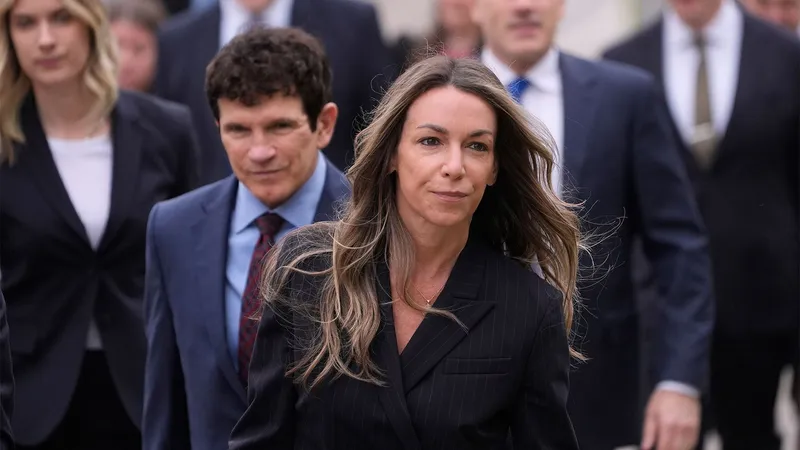DEDHAM, Mass. — The Karen Read murder trial, a case that’s gripped Massachusetts with its tangle of love, death, and distrust, roared into its second week Monday, as testimony resumed in Norfolk Superior Court. The 44-year-old woman, accused of killing her Boston police officer boyfriend, John O’Keefe, by striking him with her SUV and leaving him to die in a 2022 blizzard, sat stone-faced as prosecutors and defense attorneys clashed over a parade of witnesses. This week’s lineup—crash experts, first responders, and maybe a surprise or two—promises to crank up the heat in a trial already sizzling with tension.
The courtroom, a squat brick building off Route 1, buzzed as jurors settled in for a day of testimony that could make or break the case. Read, dressed in a crisp blazer, her blonde hair pulled back tight, faces second-degree murder and manslaughter charges. Prosecutors say she backed her Lexus into O’Keefe, 46, outside a Canton home on January 29, 2022, after a night of bar-hopping and bickering. They claim she left him unconscious in the snow, where he died of hypothermia and head trauma. Her defense team, led by the sharp-tongued David Yannetti, calls it a frame job, pointing fingers at a shady circle of cops and locals who, they say, pinned the blame on Read to cover their own tracks.
On April 22, opening statements set the stage: the prosecution painted Read as a reckless, scorned lover; the defense countered with tales of a botched investigation and small-town secrets. Last week, jurors heard from Canton police and paramedics who found O’Keefe’s body, his face bloodied, lying in a snowbank on Fairview Road. A firefighter described the grim scene—O’Keefe’s body stiff, his eyes frozen open. The testimony was raw, unflinching, and it landed hard.
Monday marked a pivot. The defense’s crash reconstruction experts, hired by the Philadelphia-based firm ARCCA, were slated to face grilling from prosecutors. These aren’t your average number-crunchers—they’re specialists who’ve spent months dissecting tire tracks, vehicle data, and O’Keefe’s injuries. Their reports, ordered disclosed by Judge Beverly Cannone on April 17, challenge the state’s narrative that Read’s SUV caused the fatal blow. The defense argues O’Keefe’s wounds—deep cuts, a fractured skull—don’t match a car strike. They’ve hinted at a fight, maybe inside the house, before O’Keefe ended up outside.
The prosecution, led by special prosecutor Hank Brennan, isn’t backing down. They’ve signaled plans to use Read’s own words against her—media interviews where she proclaimed her innocence. On April 14, the Commonwealth filed notice to introduce those statements, arguing they show Read spinning a story to dodge guilt. Brennan’s team also leaned on early witnesses, like a Canton cop who testified about finding Read at the scene, frantic, screaming she “hit him.” The defense pounced, suggesting her words were twisted, a desperate cry misread by sloppy police work.
Jurors, a mix of locals from Norfolk County, scribbled notes as the testimony rolled on. They’re not just listening—they’re set to visit Fairview Road itself, a field trip ordered by Cannone to see the spot where O’Keefe died. That visit, scheduled for April 25, could anchor the case’s geography in their minds: a quiet suburban street turned crime scene, where snow fell heavy and truths got buried.
This second week is no sideshow. The witness list, swelled to 79 names by the defense on March 19, includes seven new experts ready to poke holes in the prosecution’s case. One bombshell dropped last week, when a key state witness—a woman tied to the homeowners where O’Keefe died—admitted parts of her grand jury testimony were false. That moment, seized by Read’s attorneys on April 24, sent ripples through the courtroom, fueling defense claims of a rigged investigation.
As Monday’s session unfolded, the air was thick with stakes. Every question, every answer, felt like a brick in a wall—either building Read’s guilt or tearing it down. The trial, expected to stretch into June, is no sprint. It’s a slog, and this week’s witnesses could tip the scales.
Read remains free on bail. O’Keefe’s family, a constant presence in court, sat in the front row, their faces etched with grief. The jury, barred from discussing the case, filed out at day’s end, their notebooks tucked away. Testimony resumes Tuesday, April 29, in Dedham.

